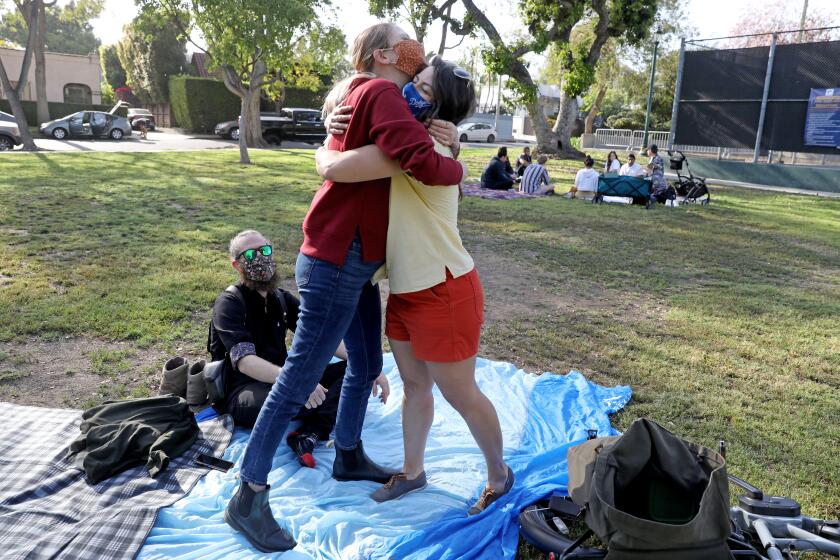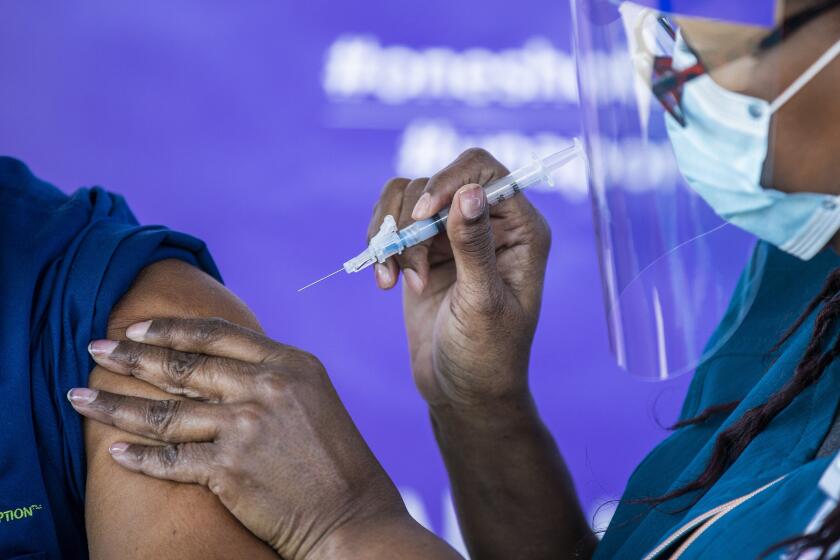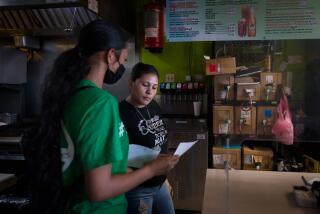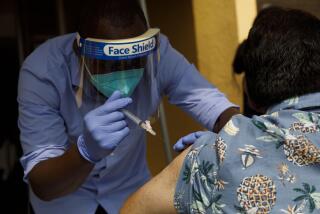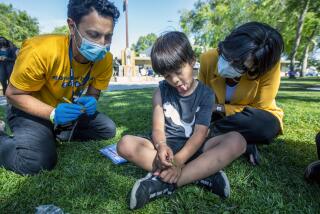Dragging the family to get a COVID-19 vaccine, one arm at a time
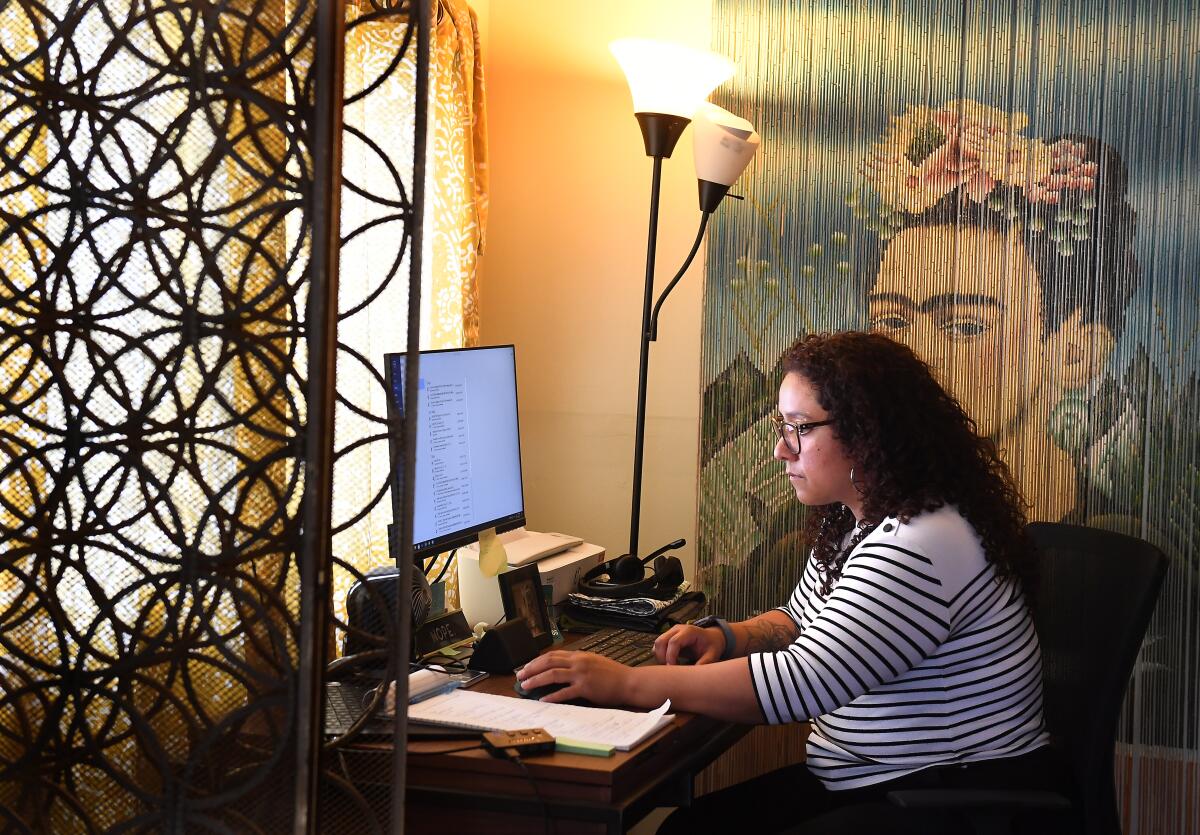
- Share via
Jackie Cornejo held her father’s hand for the last time on Jan. 31, as he died from complications of COVID-19. Ricardo Cornejo was “a true warrior,” her beloved viejito, who taught his daughter to be both generous and strong.
As she helped arrange her father’s funeral, she booked an appointment for her mother, Martha, to get vaccinated. When food service workers were eligible for the vaccine, she made an appointment for her little brother. Then one for her in-laws, her godmother, a sister and friends. At least nine — so far.
“It’s been therapeutic in a way to be able to get ... people within my world vaccinated,” said Cornejo, who works on housing policy for the city of Los Angeles when she’s not arranging inoculation appointments. “It has been a little bit stressful, but it’s also been part of how I’ve been coping. My dad never had a chance.”
Cornejo is a vaccine hunter, an unofficial hero of the coronavirus age. Wielding smartphones and tablets, PCs and Macs, these internet wranglers blast through the barriers that stand between loved ones’ arms and needles filled with Pfizer, Moderna or Johnson & Johnson.
Those barriers are legion. The sign-up process is convoluted. Not everyone has internet access. The vaccine supply has been spotty, and now the Johnson & Johnson offering is on hold because of concerns it may cause blood clots. Some people don’t trust the government. Others don’t trust the science.
In California, Black and Latino residents have fallen ill and died of COVID-19 at higher rates than other groups, and their vaccination rates have also been low.
Which means many families need a vaccine hunter. Until, that is, they don’t. Because sometimes these self-appointed saviors — fueled by love, duty and a sense that sister knows best — can quickly become the family nag.
Or as Cornejo’s mother warned the 37-year-old, who wouldn’t stop sending appointment links to relatives, “Te deberías de calmar un poquito.” You should calm down a bit.
But when you’re the vaccine hunter, “you’re riding in on your horse, guns ablazing. It’s something you can do in a year when you can’t do the things you want to do and like to do,” said Alison M. Buttenheim, an associate professor and public health researcher at the University of Pennsylvania School of Nursing.
“One downside is, you cross a line,” she said. “You can interfere with a wonderful, trusted relationship if you say, ‘I made you the appointment. Here it is.’”
Buttenheim knows this firsthand. She studies the behavioral aspects of infectious disease prevention. She founded Dear Pandemic, a social media campaign and website “where bona fide nerdy girls post real info on COVID-19.”
And she’s a vaccine hunter herself.
She thinks it’s fun. Really.
And it’s soothing, she said, on a day of relentless Zoom calls, to have five browsers open on her computer screen, to constantly refresh the different appointment portals, to problem-solve for relatives in four states. It’s not that they were hesitant; they just needed to be nudged.
First routine, then forbidden and now cherished, hugs have come to symbolize the next phase of the pandemic
The 51-year-old has made appointments for her sister and parents in Massachusetts and her husband in Philadelphia, where they live with a teenage daughter who will soon be eligible for a shot and, thus, Buttenheim’s appointment attentions. She and her husband also pestered his parents in California and their 21-year-old daughter, at school in Connecticut. All three eventually booked appointments.
Jennifer Eremeeva, Buttenheim’s sister, lectures on cruise ships about Russian history, Mediterranean history, art and culture. She hasn’t worked in more than a year. She has to fill out paperwork proving she is vaccinated if she wants to get back on the job when the industry resumes operations.
Her cruise line’s documents listed Pfizer and Moderna vaccines but not Johnson & Johnson.
“Alison wasn’t only hunting and pecking for an appointment for me, but for a Pfizer or Moderna,” Eremeeva said. “It was a gift. She doesn’t need to get me a Christmas present this year.”
But when it came to their parents, who are 78, things got more complicated. The elderly couple spent much of the pandemic with Eremeeva in Massachusetts while waiting to get into a retirement home in Pennsylvania. At first, they figured they’d just get vaccinated when they arrived at their new place. But that wasn’t good enough for a certain daughter.
Here’s how the sisters tell the tale:
Buttenheim: “I said, ‘No, we’re not waiting three weeks. This is life or death for you.’ ... I finally saw two appointments 15 miles away. It took my sister, my niece, a laptop and an iPad and my parents standing there with their insurance cards. It felt urgent. I couldn’t leave it up to them.”
Eremeeva, 54, who was trying to make dinner for husband, daughter and parents as Buttenheim booked appointments from nearly 200 miles away and the black Lab puppy barked: “I felt super frustrated and a little pushed around. But she was responding to a need of my parents. ... I’m very grateful. ... [Still,] when you have a multigenerational household, I felt like the filling in an Oreo cookie. And not in a good way.”
Krysta Villeda moved from Los Angeles to Washington, D.C., in 2012 to attend graduate school and decided to stay. But that hasn’t stopped her, her mother jokes, from trying to get her entire hometown vaccinated from more than 2,000 miles away.
First up was Villeda’s grandmother, who is 78 and lives in South Gate. After three hours on a constantly crashing website, Villeda finally booked the elderly woman an appointment at Kedren Community Health Center in South Los Angeles. One of her sons drove her.
“Something that really frustrated me is that no one else in my family took the initiative to make her an appointment or talked about it,” the 32-year-old said. “I think they just kind of assumed it was going to happen.”
Her uncle asked for help next. Since the pandemic began, Villeda also has helped him file unemployment claims every two weeks. She kept track of Washington state vaccine requirements on behalf of her younger sister in Seattle, who was set to get her shot Friday, and Orange County guidelines to help her stepsister, who was inoculated in late March.
Carlos Villeda, her 54-year-old father, was the toughest customer. The Bellflower resident was hesitant because he worried about the vaccine’s side effects.
So Villeda sent him two TikTok videos she’d made of her own vaccinations as part of her job at Project Pulso, a nonprofit digital media start-up that produces content for the Latino community.
“Overall, my recommendation is to plan to stay home the day after if you can, just in case,” she says on TikTok, wearing a flowered mask and holding a “birthday girl” balloon after her second shot. “At the very least, don’t plan anything important for right after. But it honestly wasn’t as bad for me as I was expecting.”
Her secret weapon was a daughterly threat. She hasn’t been home since December 2019. Because of her kidney transplant, she told her father, “if you don’t get vaccinated, then you’re probably not going to see me that much, or if you do, you’re going to see me from a distance.”
On April 1, the day eligibility opened up for those 50 and older, Carlos relented. Villeda sprang into action.
“I was skeptical, but I did it for her,” Carlos said. Then he laughed. “I didn’t think she was going to tell me to go the next day.”
Toxic masculinity is a hell of a preexisting condition to have during a pandemic. But Papi was finally able to see that the vaccine wasn’t about him.
Most of Villeda’s family members wanted to get vaccinated, she said. But she knew that if she didn’t step in and help, their success rate would be slow and iffy.
“They’re not very online and didn’t exactly know how/where to sign up,” she said in a message via Twitter. “I definitely felt like the burden was all on me to get these done.”
Carina De Los Santos felt a similar responsibility. Standing in line at Kedren on a breezy Monday in April, waiting for her second Moderna shot, she talked about an uncle’s death from COVID-19.
“He went pretty quick,” said the 43-year-old from Maywood, who works in the accounting department of a food-service company. “We didn’t think it was going to happen. He didn’t have any health conditions. It was a shock. His wife had it, too.”
So De Los Santos searched on behalf of two aunts who “don’t have the whole computer knowledge” and a cousin who had problems getting an appointment. It took several days of lunch hours and other work breaks before her efforts paid off.
“The fact of their age and that some have health conditions, I felt I had to give them a little push,” she said. “After that, it’s on them.”
Research has shown that even people with the intent to get vaccinated have trouble following through, said the University of Pennsylvania’s Buttenheim. Only about 45% of adults in the United States get the flu shot every year. “Way more than that” intend to, she said, but just don’t get around to it.
“We are very lazy humans,” she said. “We have these big brains. We live in an environment that pushes a lot of information at us. ... An adaptive response is to look for shortcuts. We look for the thing that’s easy to do or is bright and shiny. If the healthcare thing you want to do isn’t easy, you look for something else to do.”
Ana Lara, 46, set up vaccine appointments for her mother, father and grandfather at the same time and place in early March. The Oakland resident escorted them to get their first dose of Moderna. Her sister took them for their second.
Afterward, Lara’s uncle in Salinas reached out to their mom: “Can you ask the girls if they can find a vaccine for me?”
Several weeks ago, Lara contacted a local health center to see if her aunt, who works in a tortilla factory, would qualify for the vaccine. The answer was yes. Lara texted her aunt with the good news and put the 61-year-old on a waiting list.
“Sí, está bien, mija,” was the response. But when it came time to actually schedule the shot, the aunt balked. Lara backed off to give her aunt some space to reconsider. Her aunt has since come around, and Lara is on the hunt yet again.
She’s an administrative assistant for the city of Oakland and works from home. Any time she saw a tweet or Facebook share saying appointments were available, she’d take her break and look.
Lara searched from her kitchen table, her home office space, on her tablet while watching television. Finding appointments was “always on my mind” because her and her sister’s priority is always their family, she said.
Getting them vaccinated “meant we could be with our parents,” she said in a Twitter message. “It was really hard in the beginning, my dad got depressed and really sick. I didnt visit my grandma for like 10 months.”
She felt “burdened sometimes,” she said, “but helping my parents has always been a part of being the oldest.”
More to Read
Sign up for Essential California
The most important California stories and recommendations in your inbox every morning.
You may occasionally receive promotional content from the Los Angeles Times.
